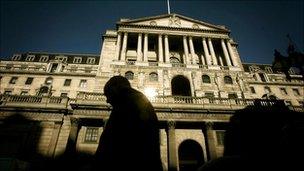Shares jump as central banks try to ease financial woes
- Published

The Bank of England is one of six central banks taking part in the co-ordinated action
Global stock markets surged as some of the world's big central banks launched plans for co-ordinated action aimed to support the financial system.
Wall Street's Dow Jones index saw its biggest gain since March 2009, rising 4.2%, after jumps on European bourses.
It came after the US Federal Reserve, European Central Bank, and the central banks of the UK, Canada, Japan and Switzerland acted to improve lending.
Their move includes making it cheaper for banks to buy US dollars.
It is hoped that this will ultimately help businesses and households get access to finance more easily.
As well as cheaper US dollars, the central banks will also provide easier access for banks to other major currencies as and when they need it, beginning 5 December.
Investors cheered the move, sending Wall Street's other key indexes, the S&P 500 and tech-rich Nasdaq, also more than 4% higher.
Germany's Dax index closed 5% higher, while France's Cac 40 jumped 4.2% and the UK's FTSE 100 rose 3%.
Banks were particular beneficiaries. Wall Street titans JP Morgan and Bank of America rose 8.4% and 7% respectively.
In the UK, Barclays surged more than 6% and shares in Lloyds and Royal Bank of Scotland ended more than 7% higher.
'Reward'
In France, BNP and Societe Generale each rose 4.6%, while Credit Agricole closed 8.4% up. In Germany, Deutsche Bank rose 6.2%.
The euro also rose on the news, gaining almost 1.5 cents against the dollar to $1.345. Against the pound, the euro was up slightly at 85.68 pence.
"You don't have to fix everything, you have to be on a path towards fixing things," said Tobias Levkovich, chief US equity strategist at Citigroup.
"Markets will reward you for the efforts you are making as long as you are moving in the right direction. It's the carrot and the stick; you get rewarded when you do the right thing, and you get punished when you do the wrong thing," he said.
Michael Hanson, an economist at Bank of America Merrill Lynch, added: "The coordination was a big thing. It had a psychological effect."
US Treasury Secretary Timothy Geithner welcomed the move by central banks, which he hoped would take pressure off the European financial system.
Mr Geithner said: "We welcome and support the actions taken by central banks around the world today to help ease pressure on the European financial system and help foster the global economic recovery."
Mr Geithner, and also President Barack Obama, have strongly urged Europe to get to grips with its debt crisis.
'Boost'
As the eurozone debt crisis has deepened, banks have found it harder to access finance. They are concerned that some governments they have lent money to may be unable to pay it back.
This means they are becoming increasingly reluctant to lend to one another - a key mechanism through which banks access finance.
For example, on Tuesday night banks deposited 300bn euros ($405bn; £257bn) with the ECB, 100bn euros more than two weeks ago.
Analysts said the central banks' move would help to relieve some of this strain within the global financial system.
"This shows that central banks across the world continue to co-operate and that the ECB, and its partners, are very aware of the funding stress that European banks are under at the moment," said Christian Schulz at Berenberg Bank.
"This decreases the cost of funding in US dollars or other currencies so it's small, but it's a boost to banks' profitability and gives them a better chance to shore up their capital ratios."
Richard Hunter at Hargreaves Lansdown Stockbrokers said the joint action was "designed to prompt an increase in lending, whilst at the same time reducing some of the strains under which credit lines are currently operating".
If banks take advantage of the cheaper funding, "a great deal of tension will be removed from the system, both in terms of liquidity and market sentiment", he added.
Earlier on Wednesday, China's central bank unexpectedly said it would cut the limit on the amount of cash the country's banks have to hold in reserve in a move designed to boost lending.
The bank had been increasing the rate to reduce lending in order to dampen demand and tackle rising prices.